- Home
- Garth Stein
A Sudden Light
A Sudden Light Read online
Thank you for downloading this Simon & Schuster eBook.
* * *
Join our mailing list and get updates on new releases, deals, bonus content and other great books from Simon & Schuster.
CLICK HERE TO SIGN UP
or visit us online to sign up at
eBookNews.SimonandSchuster.com
CONTENTS
EPIGRAPH
PROLOGUE: THE CURSE
1. THE NORTH ESTATE
2. LEAVING NEW HAVEN
3. DINNER IS SERVED
4. THE MIGHTY ELIJAH
5. IN THE NIGHT KITCHEN
6. THE TALK
7. THE BOOK OF JONES
8. INNOCENCE LOST
9. THE MOUNTAINS OF CALIFORNIA
10. BEN’S WORLD
11. BIRTHDAY DINNER
12. ROOSEVELT AND HIS MAN PINCHOT
13. THE DISCOVERY
14. TREE CLIMBING
15. AWAKE THE SLEEPING GIANT
16. CHAMBER OF SECRETS
17. THE RETURN OF THE HAND
18. SERENA’S VISIT
19. THE SEARCHERS
20. THE COTTAGE
21. NIGHT DANCING
22. TELL ME ABOUT YOUR MOTHER
23. THE BASEMENT
24. AUTOMATIC WRITING
25. THE DILEMMA
26. DICKIE DANCES
27. THE FALLEN
28. THAT MAN’S FATHER IS MY FATHER’S SON
29. A FIGHT OVERHEARD
30. BEHOLD, THIS DREAMER!
31. BAD AUNT
32. BONFIRE OF THE MEMORIES
33. QUID PRO QUO
34. HOUSE OF STONES
35. A SEDUCTION
36. TRUTH OVER LOYALTY
37. A SUDDEN LIGHT
38. THE HAUNTING
39. DOUBLE JEOPARDY
40. BEN’S TREE
41. THE DUMBWAITER
42. REDEMPTION
43. THE TRUTH WILL OUT
44. THE LAST DANCE
45. SAILING AWAY
46. AFTER THE FALL
EPILOGUE: FINAL REUNION
ACKNOWLEDGMENTS
READING GROUP GUIDE
ABOUT GARTH STEIN
for my dead father
We do not see things the way they are, we see them as we are.
—ANAÏS NIN
– prologue –
THE CURSE
Growing up in rural Connecticut, I had been told the name Riddell meant something to people in the Northwest. My paternal great-great-grandfather was someone of significance, my mother explained to me. Elijah Riddell had accumulated a tremendous fortune in the timber industry, a fortune that was later lost by those who succeeded him. My forefathers had literally changed the face of America—with axes and two-man saws and diesel donkeys to buck the fallen, with mills to pulp the corpses and scatter the ashes, they carved out a place in history for us all. And that place, I was told, was cursed.
My mother, who was born of English peasant stock on the peninsula of Cornwall, made something of herself by following her passion for the written word, eventually writing the dissertation that would earn her a Ph.D. in comparative literature from Harvard University and becoming the first in her family to receive an advanced degree. Though she never did anything of note with her brilliance, she did carry it around with her like a seed bag, sprinkling handfuls of it on what she deemed fertile soil. She spent much time quoting literature to me when I was young, thus sparking my own avid reading habits. So the theme of the Ancient Mariner and his story, as told by the poet and philosopher Samuel Taylor Coleridge—and how the Mariner’s story was emblematic of my family’s history—was something I had heard often before my fourteenth birthday.
The curse. When one destroys something of beauty and nature—as did the Mariner, who shot the kindly albatross that led his ship out of the perilous Antarctic seas—one will be punished. Cursed. My mother told me this; my father nodded when she did. Punishment will rain down upon the offender and the family of the offender, I was told, until the debt is settled.
The debt owed by my family has been paid, and then some. My mother believes our family’s story was settled with that debt—she has always maintained an unyielding faith in the cathartic power of denouement—which is why she has chosen to go for a walk this morning, rather than stay with us to hear me tell our story again. But I disagree with my mother: there is no tidy end to any story, as much as we might hope. Stories continue in all directions to include even the retelling of the stories themselves, as legend is informed by interpretation, and interpretation is informed by time. And so I tell my story to you, as the Mariner told his: he, standing outside the wedding party, snatching at a passing wrist, paralyzing his victim with his gaze; I, standing with my family at the edge of this immortal forest.
I tell this story because telling this story is what I must do.
Twenty-some years ago, before technology changed the world and terrorism struck fear into the hearts of all citizens. Before boys in trench coats stalked and murdered classrooms full of innocent children in schools across this fair land. Before the oceans were thick with oil slicks and the government ceased to govern and Bill Gates set out to love the world to death and hurricanes became powerful enough to stagger entire cities and toxic children were drugged into oblivion to drive up the profits of Big Pharma, and genetically modified foodstuffs were forced upon us without us knowing we needed to care. Before smoking marijuana at gay marriages became passé—before gay people became, eh, just like anyone else, and weed became, eh, just another source of tax revenue. This was even before another famous Bill, the one surnamed Clinton, became famous for his choice of cigars. It seems like ages ago, looking back on it. No smartphones. No On Demand. Nary an iPad in sight.
So long ago. Yes. This story begins in 1990.
On a hot July day in Seattle, a sickly pea green rental car drives from Sea-Tac airport northward on Interstate 5, through the sprawl of neighborhoods hidden by hills, tucked away behind bridges and bodies of water. Its passengers, a father and a son, don’t speak to each other. The boy is nearly fourteen, and he is unhappy. Unhappy with being displaced from his childhood home and forced on an unwanted road trip. Unhappy with his mother for not being with him. Unhappy with his father for simply being. So he doesn’t speak; he concentrates on Pink Floyd’s The Wall, which he listens to intently through the headphones of his Walkman.
His father looks over at him frequently, nervously. He seems to crave the boy’s approval, which the boy will not give. As they approach the city from the south, the boy glances up and notices the Space Needle, that ubiquitous and baffling Seattle icon. He winces at the irrelevance of the monument—who on earth would build such a thing, and what kind of citizenry would keep it?—and lowers his eyes again to his shoes, which are far more interesting to him.
He doesn’t notice as they drive through the city, but drive through the city they do. They emerge on a high bridge.
“Don’t you want to see this?” the father says, finally, desperately, tapping the boy’s shoulder and indicating the glory of Seattle all around them.
The boy lifts his eyes and looks around. Bridges, lakes, bland buildings, radio towers, floatplanes, mountains, trees. He’s seen it.
“No,” he says and returns his focus to his music. The voices chant at him: Tear down the wall. Tear down the wall.
And so my story for you begins.
– 1 –
THE NORTH ESTATE
When we exited the freeway at the northern city limit, I remember being disappointed at plunging into typical American suburbia. A House of Fabrics and a Las Margaritas Mexican Restaurant. Cliff’s Card Room, Gene’s IGA, an ARCO station, a plumbing supplier. It was worse than I could have imagined.
We crossed a bleak avenue at an intersection with far too many cars waiting to turn left on a green arrow. But then the street narrowed to two lanes instead of four, and the trees began to lean over the road, blocking the sky. I took note of the transformation. I clicked off my Walkman as my father turned our car onto a still smaller road and guided us down a drive; soon we reached a guard booth with a gate. My father rolled down his window; the door of the wooden booth slid open and a uniformed guard stepped out. He was an old guy and soft, and didn’t look like he could stop a full-out assault if someone wanted to lay siege to The North Estate, which he was evidently paid to defend.
“Who are you visiting?” the guard asked cheerfully.
“Not visiting,” my father said. “Coming home.”
The old guy cocked his head, and then realization swept over his face. “I’ll be good goddamned,” he said. “Jones Riddell.”
“Val,” my father said. “I can’t believe they still have you working the gate.”
“They tried to retire me a few years ago, but I couldn’t stand being alone all day so they took me back.”
Both men fell silent, and I remember feeling a nearly overwhelming urge to blurt out the blatantly obvious question: How is sitting in a guard booth by yourself all day not the same as being alone?
“How long has it been, Jones? A long time.”
“Twenty-three years.”
“Twenty-three years. Your mother was a fine woman.”
“Indeed she was.”
“A real tragedy.”
Val nodded to himself and then smacked the roof of the car and straightened with a hitch of his pants. He walked to the old wooden gate and pulled a counterweight; the arm arced upward, clearing the path. As we eased by, Val waved. “Welcome home,” he called out.
What tragedy? The death of my grandmother was a taboo subject. I’d tried asking about her before and it didn’t work; my father wouldn’t talk about it. I’d become convinced that my father would never talk about it.
As we drove away from the guard booth, the world changed as if we had been teleported into a medieval forest. We snaked through ravines and past driveways leading to houses I could barely see because they were set so far back and a million trees stood between the houses and the road. Evergreen trees: cedars and spruce, firs and pines. Deciduous trees: oaks and birches, maples and madrona, that peculiar Northwest species with its red peeling bark. Deeper and deeper we drove into the forest; the house markers grew less frequent, the drives became more grand, gates began to block access, jagged stone walls ran alongside the road. As we continued, it felt like we were going further back in time. The winding lane withered into a pockmarked and pothole-riddled gravel path that crunched under our tires like the brittle bones of the dead, and then we got to the end of the main road. To the side of the road was a broken iron gate, laid off its hinges long ago by grounds workers long gone, and I knew we had arrived at our destination because there was nowhere else to go.
We crossed the threshold of the property and continued along the winding driveway, which dipped down into a cool ravine before rising quickly to a crest that revealed a broad clearing on a bluff overlooking Puget Sound. My father pulled the car to a stop on the drive, and I found myself speechless. Not out of protest; no. But because I was stunned into silence by the sight of Riddell House.
My father had told me about it, the place of his father’s birth and home to two generations before that. He’d described in vague, sketchy terms the house built by his great-grandfather nearly a century ago. But he’d only outlined the deficits of the house. It was falling down, he told me. It’s practically condemned, he said. We’re only going there to put it out of its misery, knock it down, sell off the land, and be done with it. But he didn’t tell me the whole story, apparently, because Riddell House was not what he’d described. I was expecting a rickety old shack, hardly worth the time to glance at. What I saw was not a shack.
My father climbed out of the car; I followed and stood next to him at the edge of the drive. Across a vast field of dry grass loomed a massive structure made of logs and bricks and stones, crowned with a roof of heavy cedar shakes accented by green copper downspouts and flashing. The house was circumscribed by a veranda on both the first and the second of the three floors. The drive swept past a grand front stairway and looped around to meet up with itself again, while a spur split off and disappeared behind the house. I quickly counted a dozen chimneys, though I was sure there were more; I estimated at least a hundred windows, though I didn’t take the time to count. The house appeared squat from our perspective, as if it were hunkering down to the earth. The pillars that encircled it and made up much of its exterior walls were tree trunks. Fully grown, giant trees. Stripped of their limbs and clad in their native bark. Each one, a perfect specimen. The tree pillars stood vertically, side by side—the tallest of them fifty feet, by my estimation, at the roof’s peak—a regiment of silent, glaring giants.
Riddell House.
I took a deep breath and inhaled the breeze: shellfish and seaweed and mud. It smelled like low tide when I was a kid and my parents would take me out to Mystic, Connecticut, for the day. Littleneck clams and rock crab and seaweed. The wind blowing, and me, fighting against the flapping paper nest that held my fries in the plastic basket. My father smiling at my mother with soft eyes, and then leaning in to kiss her. My mother kissing back. And me, finally retrieving a fry, and thinking it was the best fry in the world.
The things we remember.
To the west, Puget Sound sprawled out between us and the trees and wilderness of the Kitsap Peninsula and the curtain of mountains beyond that, rising blue into their jagged peaks.
“First objective completed,” my father said. “Locate and identify Riddell House.”
My relationship with my father at that point in my life wasn’t horrible, but it was pretty superficial. It was based on things that weren’t, rather than things that were. We didn’t simply go to the store or clean the gutters; we executed “missions.” We used code words. We went into “stealth mode,” or did something “commando-style.” His big line was “we’re in the acquisition and development phase.” Like we had to create an artifice around everything. An ironic layer. We wrapped a protective coating of self-consciousness around the things we did, and, as a result, sincerity was almost entirely lacking. We were going to buy eggs at the store. But not really. We were embarking on Project Ovum, which entailed executing a series of missions that concerned national security. When I was little, I thought it was cool; I didn’t think it was cool when I was verging on fourteen. Because I began to realize it wasn’t a kid’s game for my father; it was how he lived his life.
I stretched and rolled my head around on my shoulders. It felt good to be out of the car and in the hot sun. I watched the breeze sweep across the meadow and bend the long grasses toward me with an invisible hand. The breeze reached me, swirled around, and cooled my neck.
“I don’t get it,” I said. “It looks fine to me. Why are we tearing it down?”
My father looked at me for a moment.
“It’s rotten” was all he said, and he motioned for me to return to the car.
We drove the final stretch of gravel drive that sliced across the field like a gray scar; when the car stopped, a cloud of dust swallowed us whole for a moment. When it cleared, we got out to examine the monolithic house, which, from up close, soared into the sky and blotted out all else. The heft of it was powerful; the trees that made up its walls were immense. Maybe it was the long flight and the long drive; maybe it was feeling like I was on solid ground for the first time after our journey—but I felt almost overcome with emotion. I didn’t cry, but I had that pre-crying feeling, and I wondered at it. I wondered why I felt something so visceral. I felt somehow inspired.
“It’s rotten,” my father repeated.
Why should my father insist on such a thing? I looked over at him; he shook his head pitifully. I looked back at the house and tried
to see it through his eyes: the brick foundation was brittle; mortar between the bricks had flaked away in places and holes penetrated into the darkness. The flower beds were unkempt; ivy snaked up the log pillars, heavy and tenacious, glued to the wood with pale tentacles. We mounted the steps, and I noticed the warped planks of the porch. The windows were composed of small panes of rippled glass, distorted, full of imperfections. Many of the panes were cracked, and some of them had been broken out and replaced by plywood. My father rapped his knuckles on one of the pillars and frowned at the hollowness of the sound. I heard it, too. It sounded dead.
My father picked at the chinking with his fingernail; the dry mortar scraped off, turned to dust, and was gone. We both saw the paint on the window frames, which peeled off in long, jagged strips, and we saw the cracks between the window frames and the cedar shakes. Riddell House was, indeed, rotten.
“Would it pass inspection?” I asked.
“You mean by a person who wasn’t in a coma?” my father responded.
He knocked at the door. He tried the latch. He knocked again: nothing.
“I told Serena what time we were getting in.”
He reached up and felt along the top of the doorframe; he produced a key.
“Some things never change,” he said, and he slipped the key into the lock. The front door opened.
I remember feeling pulled in by the magnetism of the place as I stepped into the entry hall. It was like a time capsule, recently defrosted from the center of a giant glacier. A fully intact world from turn-of-the-century Seattle; a museum. A dusty, faded, moth-eaten museum.
It was a world that smelled of decay, heavy with moist, thick air, which floated in the rooms like an invisible fog. The interior was constructed of fine wood, in contrast to the unmilled trees of the facade. Dark wood with inlays and tight grain and chocolate stain. Oriental rugs in all the rooms and a grandfather clock that was not tick-tocking, its hands poised at six-fifteen. The foyer soared upward into an atrium. A hallway opposite the front door disappeared into the darkness, and a wide staircase climbed up to a second-floor balcony. I stepped into the room to my right and looked around. The furniture was plush and overstuffed; the rugs and walls and ceiling were dark and somber. Iron lions, sitting up on their haunches with their claws bared, guarded a central fireplace. On the wall next to the fireplace hung a painting nearly eight feet tall, depicting a well-dressed man with wild silver hair and a cane. He was looking directly at me, and he held out his hand in such an aggressively welcoming gesture that I was startled.

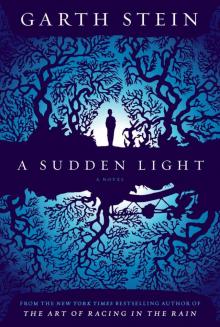 A Sudden Light
A Sudden Light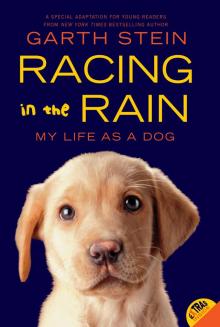 The Art of Racing in the Rain
The Art of Racing in the Rain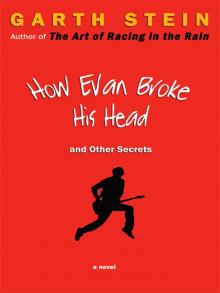 How Evan Broke His Head and Other Secrets
How Evan Broke His Head and Other Secrets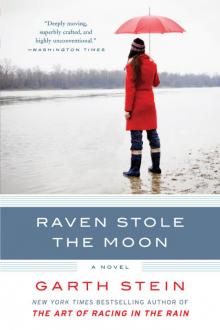 Raven Stole the Moon
Raven Stole the Moon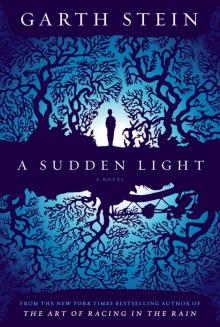 A Sudden Light: A Novel
A Sudden Light: A Novel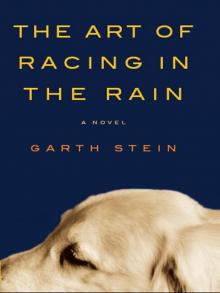 Art of Racing in the Rain, The
Art of Racing in the Rain, The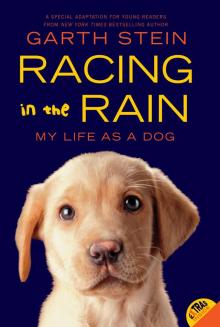 Racing in the Rain
Racing in the Rain